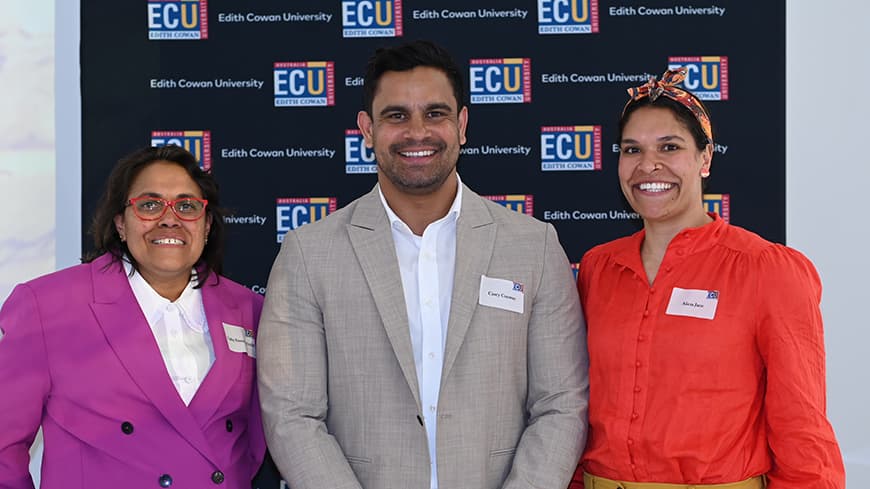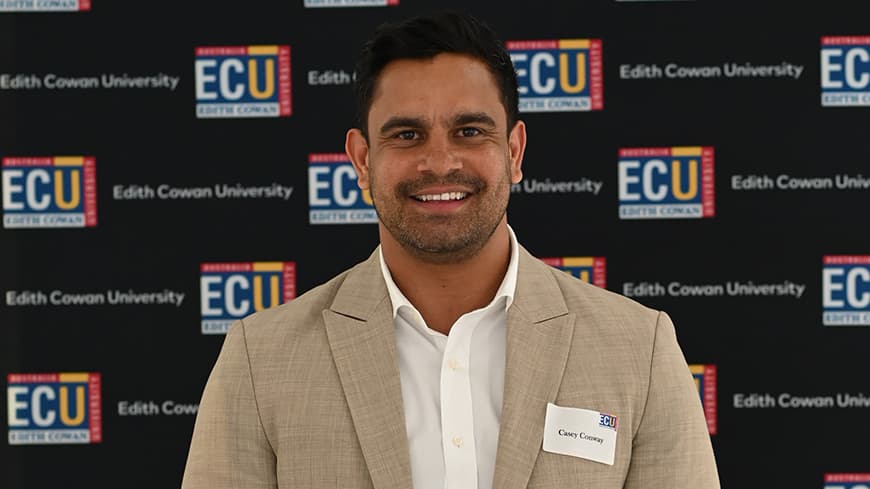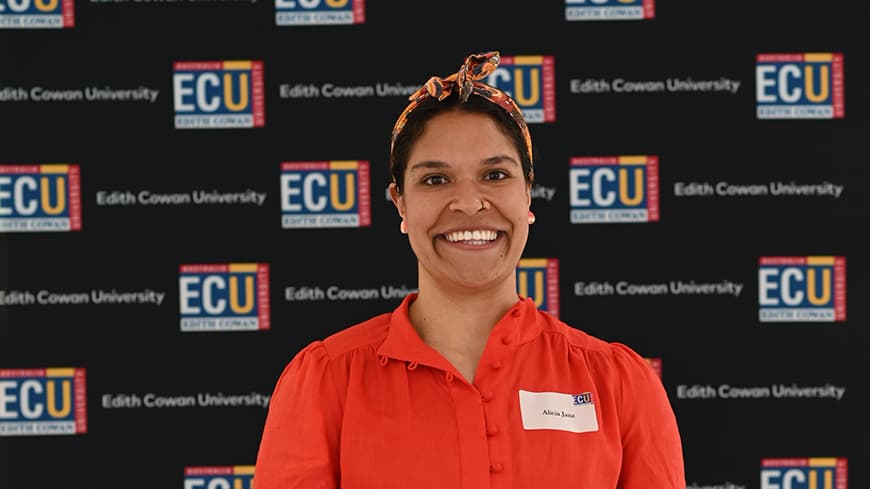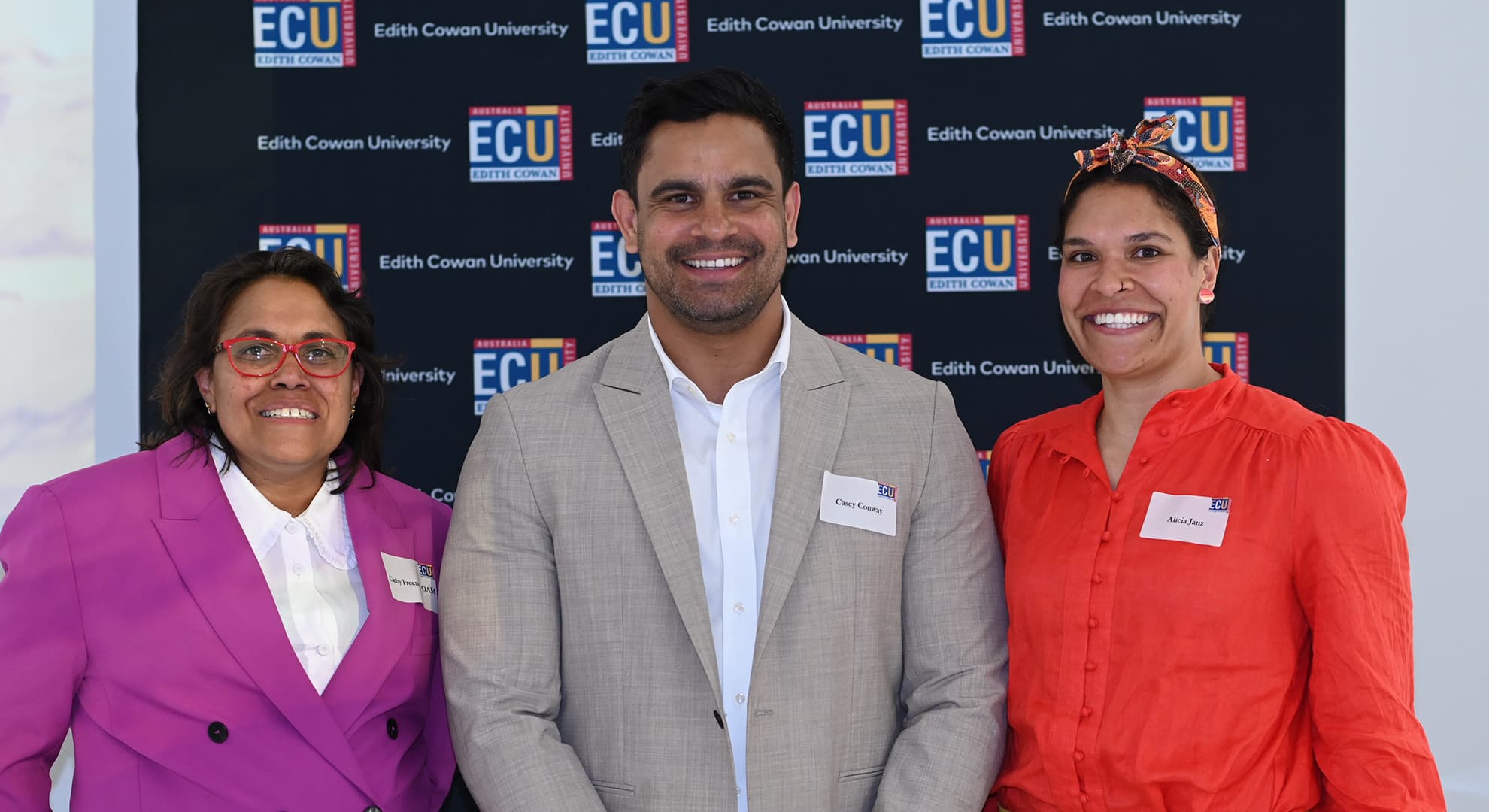 Cathy Freeman OAM, Casey Conway and Alicia Janz.
Cathy Freeman OAM, Casey Conway and Alicia Janz.
The ECU community recently welcomed Aboriginal and Torres Strait Islander Australian sporting legends Cathy Freeman OAM, Casey Conway and Alicia Janz to discuss their personal and professional experiences, and this year's NAIDOC theme: Get Up! Stand Up! Show Up!
The moment that marked a millennia
A proud Kuku Yalanji, Magarr-Magarr Warra and Birri Gubba woman, Cathy Freeman is universally known for running the race that stopped a nation.
In front of 110,000 people at Sydney's Olympic stadium on 25 September 2000, Cathy became the first Australian Aboriginal person in history to win an individual Olympic gold medal.
Cathy's success in the 400m women's final marked a significant moment in Australia's history, and the path we continue to walk towards reconciliation.
Despite previously being publicly reprimanded following her victory in the women's 400m final at the 1994 Commonwealth Games, for celebrating with the Aboriginal flag as well as the Australian flag, Cathy took a brave stand to lead change.
Her post-race celebration as she again held up the Aboriginal flag with pride alongside the Australian flag at the 2000 Sydney Olympics, is immortalised in our collective memories.
The 2000 Sydney Olympics marked not only a coming together of nations – it became a pivotal moment which united the Australian people, in celebration of an Aboriginal sporting champion. Cathy standing up that day advanced the conversation of acknowledgement, inclusivity and celebration of Aboriginal people and culture.
The power of believing in yourself
 Cathy Freeman credits her Year 1 teacher for encouraging her to run in the school sports day race.
Cathy Freeman credits her Year 1 teacher for encouraging her to run in the school sports day race.
A self-described 'painfully-shy' child, who hid in the toilets on her Year 1 school sports day, Cathy credits her 'pushy teacher' for encouraging her to give it a go.
"I felt quite out of place at school. But from the moment I took my first step in that race I felt like a completely different person. I felt free, I felt happy, I loved it," Cathy said.
"Then when my stepfather Bruce Barber saw me run, he saw in me someone who could go a long way. So I was really fortunate that belief started at home for me."
Another instrumental character in Cathy's journey as an athlete, was her high jump coach, John Sessarago.
"At 14 years old he quoted to me "it is our doubts of today that limit our realisations of tomorrow" (Roosevelt) and that stuck with me," she said.
"My coach from high school (Mike Danila) also told me he believed that one day I'd be signing autographs at the Olympics.
"I must have believed in their belief in me, or I wouldn't have so steadfastly gone down that path."
Cathy said that in moments of doubt, the mentors and community you are surrounded by can play a big part in kick-starting – or rebooting – your passion and drive to pursue your dreams.
"In 1997, I'd had a bit of a personal crisis. It was a dark period in my life. We're all human beings, we all struggle, and I wasn't sure if I could get myself back up to compete for the 1997 World Championships title.
"With the support of a dear mentor / colleague / friend, I managed to pick myself back up and I went out and won my first world title. That gave me great confidence leading into the Sydney 2000 Olympics.
"That was probably my proudest moment. You know when you have those moments when you just feel like giving up, but don't. I'm prouder of that, than winning gold at Sydney."
Bring your whole self to what you do
 Cathy Freeman discussing her experiences as an Aboriginal Australian athlete.
Cathy Freeman discussing her experiences as an Aboriginal Australian athlete.
Reflecting on the much-debated role of social and political matters in sport, from racism to homophobia and sexism, Cathy said if elite sporting institutions are really interested in optimal performance, they have to rethink their whole approach.
"In order to pull the best out of people, you have to embrace all of who they are. Forget the focus on winning, winning, winning," she said.
"For example, it's totally absurd to expect any blackfulla to remove yourself completely from your family and your community, separate to having a platform in sport.
"I am my mother's daughter and my grandmother's granddaughter always first and foremost, and you can find real power in your full identity. Within the frame of an Aboriginal athlete in the spotlight isn't just one person, it's a whole bunch of people and family."
"I'm so proud of who I am, where I'm from and who I belong to. My family's strength gave me my own sense of self-determination. You can't separate the athlete from the person."
The role of sport in confronting discrimination
 Casey Conway.
Casey Conway.
Former professional rugby league footballer and NRL manager for diversity and inclusion, Casey Conway said sporting organisations have a responsibility to have a position on all social issues that impact people who participate in sport.
"Sport is something that's woven into the fabric of our country and it's what brings us together," he said.
"Anyone can learn a lot of positive lessons from participating in sport.
"However, it's a fine line between sporting organisations inserting themselves into spaces they don't have expertise or lived experience in, or whether they've consulted the right people, but they need to support the athletes, and the wider community that supports them.
"That doesn't mean chucking a blackfulla in front of a camera after a racist incident, or a woman or LGBTIQ person after a sexist or homophobic incident, and so on."
A proud Barada man, Casey made the decision to 'come out' about his sexuality after retiring from professional rugby.
"I thought, if my teammates are making jokes or being casually racist, sexist or homophobic, how am I supposed to tell them I'm gay?
"For one thing I didn't really understand what it meant to be a gay blackfulla, but secondly, I didn't feel safe to be my whole authentic self in that space."
Casey implored sporting organisations to go beyond speaking out during NAIDOC Week, Indigenous rounds, PRIDE month, and other days of significance for intersectional groups.
"It should be a conversation that happens every day of the week, and we should empower athletes to not step away from their family or community."
"The big difference is that more organisations want meaningful change, they start with the bare minimum like having an Indigenous or PRIDE jersey, to thinking holistically about education and culture, creating meaningful partnerships in the community, and giving kids opportunities to succeed."
Casey also expressed the importance of stimulating both your mind and your soul in order to achieve at a high level, and that both education and sport have a role to play.
Championing diversity and inclusion
 Alicia Janz.
Alicia Janz.
Former professional netballer, and AFLW player representing both the Fremantle Dockers and West Coast Eagles, Alicia Janz said all women should feel empowered to get involved in sport.
"My big sister Josie, who also played for (West Coast) Fever, inspired me to play netball and my friend Kirby Bentley encouraged me to play footy," she said.
"I love sport, the physicality and the aggressiveness, which as women we're often not seen as that. I just love sport, being a part of a team and creating strong bonds with teammates."
Education a vehicle for change
A proud First Nations Islander woman who grew up off-country in Derby, Western Australia, Alicia now works alongside her sister at the Waalitj Foundation as the Deadly Sista Girlz Operations Manager.
"I've used my connections through football to drive education and I share my experiences when it comes to racism and inclusion.
"The work I've done working with AFL staff on inclusivity of First Nations people within the club, for players and to help educate them – knowing that's staying behind and there's growth and it's continuing – that makes me really happy."
Alicia said she was more successful in sport than in the classroom growing up because she felt more willing to ask questions and learn.
"I wonder what more I would have learned and grown from if I had felt more confident to have these conversations with teachers," she said.
Encouraging future generations to reach their potential
 Back row (L-R) Professor Braden Hill, Alicia Janz, Casey Conway, Dr Libby Jackson-Barrett.
Front row (L-R): Cathy Freeman OAM, Dr Roma Winmar, Tracey Taraia.
Back row (L-R) Professor Braden Hill, Alicia Janz, Casey Conway, Dr Libby Jackson-Barrett.
Front row (L-R): Cathy Freeman OAM, Dr Roma Winmar, Tracey Taraia.
The event's MC and panel chair, ECU's Deputy Vice-Chancellor (Students, Equity and Indigenous), Professor Braden Hill, thanked guests for sharing what was a resounding message on the importance of education and mentoring support as a collective mission for all.
More than $2,800 raised from ticket sales will go towards supporting ECU's Indigenous UniGames initiative. These high-quality sporting opportunities, prioritise health and wellbeing, and social connectedness within the Indigenous university community across Australia.
Be a part of a better future
Aboriginal and Torres Strait Islander Students
At ECU, we help Aboriginal and Torres Strait Islander people and their communities to achieve their dreams and aspirations through further education. Our Centre for Indigenous Australian Education and Research, Kurongkurl Katitjin, is committed to assisting students with choosing a university entry pathway and in understanding and adapting to university life.

 Aboriginal and Torres Strait Islander Australian sporting legends Cathy Freeman OAM, Casey Conway and Alicia Janz.
Aboriginal and Torres Strait Islander Australian sporting legends Cathy Freeman OAM, Casey Conway and Alicia Janz.

